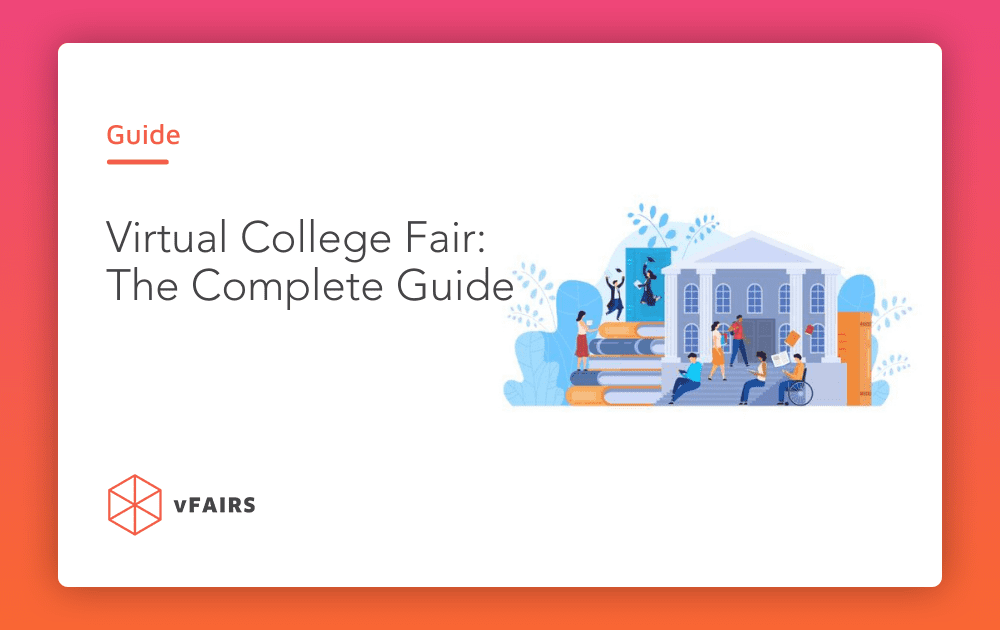College fairs are a great opportunity to help your students with their college search. A virtual college fair isn’t any different. It can be just as valuable for high school students, parents, and counselors since it simulates an in-person event. But they do need to be approached differently, and having the right strategy in place can do wonders for your event.
To help you host an incredible virtual fair, we have put together this guide. In it, we’ll cover everything you need to know to host a fair that delivers value to your students and exhibitors.

What Is a Virtual College Fair?
A virtual college fair connects your students and their families with college representatives on an online platform.
Virtual college fairs offer an interactive digital space for your students to learn more about colleges and universities they are interested in. It also helps representatives recruit students for their institutions by showcasing their academic programs, campus, faculty and student life.
A school may host its own college fair online or collaborate with other local schools.
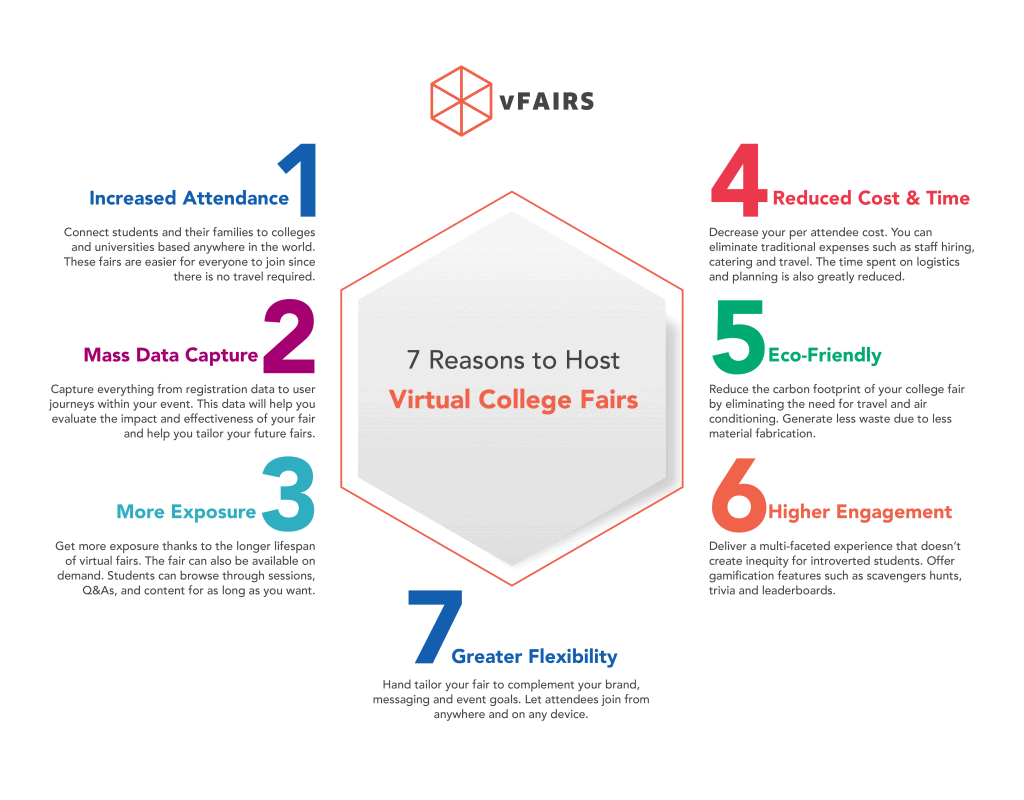
7 Reasons to Host Virtual College Fairs
There are a number of reasons why you should host a virtual admission fair for your students. Let’s look at some of them.
1. Increased Attendance
A virtual college fair helps connect your students and their families to colleges based anywhere in the world. These fairs are easier for everyone to join since there is no travel required. People can join your fair from the comfort of their home as long as they have a smartphone or a laptop and an internet connection.
According to Event Marketing Blog, 34% of event planners consider increased attendance the most positive result of switching to virtual events.
If you are a consortium of universities trying to promote your academic programs to a global audience, an online fair is perfect for you. You can attract attendees from all around the world to your event.
And that’s not all.
As an organizer, you won’t have any space constraints. You can host as many attendees as you like.
2. Mass Data Capture
A good virtual events platform has extensive reporting capabilities. It can track everything from registration to attendance to student activity. You will be able to track every move your virtual admission fair attendees make in your event. You will know which webinars they watched, who they chatted with, what documents they downloaded, which booths they visited, etc.
Sounds pretty good, right?
This data will help you evaluate the impact and effectiveness of your fair. It can also help you tailor your future virtual fairs. You will know exactly what your students found valuable and can build on that information.
The data you collect can also be shared with college representatives. In-person events make such reporting and analytics impossible. At the most, a physical event has a sign-in sheet for visitors. Your exhibitors will be won over with big data capture that is possible with virtual education fairs. It will allow them to nurture leads better than ever before.
3. More Exposure
Your college fair sponsors and exhibitors will benefit from more exposure on a virtual platform. Virtual events have a longer lifespan than their physical counterparts. A college fair might typically last for one to two days. A virtual college fair can have as many live days as you’d like.
But wait, it gets better…
The virtual fair can also be available on demand for as many weeks or months as you’d prefer. This means that all your webinar sessions, Q&As, and booth content is available for students to browse through for as long as you want.
4. Reduced Cost & Time
Planning and hosting an online university fair is quite affordable compared to an in-person event. Virtual fairs decrease your per attendee cost. You can eliminate traditional expenses such as staff hiring, catering, and travel.
And the best part?
The time spent on logistics and planning is greatly reduced. A good virtual event provider will take care of most of the fair set up for you and offer customer support for any issues that crop up.
5. Greater Flexibility
An online college fair is flexible by design. You can use different interactive and online elements to complement your school’s brand and messaging. Moreover, these fairs are hand-tailored event spaces that can be accessed by students at any time and from anywhere. If a student missed a live webinar, he or she can still watch it at a later time.
It doesn’t end there…
Virtual education fairs also offer you the fluidity of language, level of interaction, monetization options and much more. For instance, if your fair is for international students from a particular country, you can offer live translation or captioning for all your sessions.
6. Higher Engagement
Many students may not feel comfortable asking questions during a crowded, more traditional fair. An online fair will help your students get more personalized information than can typically be found on a college’s website. Virtual college fairs allow you and your exhibitors to host multimedia files right within the platform. Organizers can integrate chat, webinar, podcasts and other means of communication into a single environment. This helps you deliver a multi-faceted experience to your students.
Unlike an in-person college fair, your virtual fair will not create an inequity for more introverted students who do not draw their energy from large crowds and brief interactions.
Some platform providers also offer gamification features to create a more engaging experience for students. This could be in the form of scavenger hunts, trivia and leaderboards within your fair.
7. Eco-Friendly
According to Birmingham University, a one-day physical event can produce up to 170 kg of CO2 and create over five ton of refuse waste. College representatives have to travel to a single meeting location from all over the country or from around the world. For district-wide and regional fairs, students and their families have to travel to your physical event venue as well.
So, how are virtual fairs more eco-friendly?
When you do away with travel and large venues with air conditioners, you can significantly reduce the carbon footprint of your college fair. Your online fair will also generate less waste due to less material fabrication and no large-scale food and beverage service.
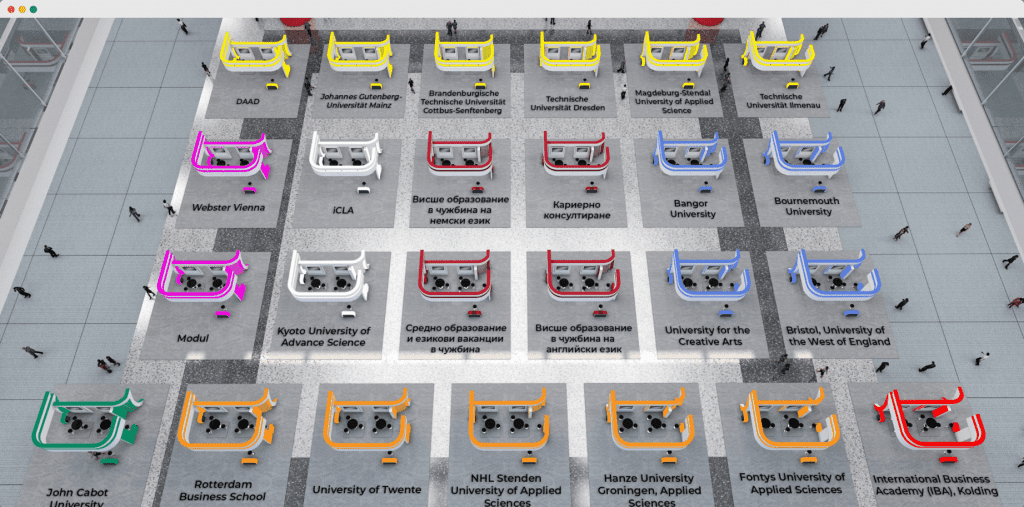
How to Host a Virtual College Fair
Preparing a virtual education fair platform takes dedication and hard work. Here are some suggestions for conducting a successful fair.
1. Choose the Date Early
It’s better to start planning your fair months in advance. A lead time of three to four months would be ideal for your online fair. Virtual event providers typically need two months to help you set up your event.
This should also give you plenty of time to invite colleges. Many reps plan their schedule in early summer. A good lead time will help you get the college participation that you would like.
Pro-tip: If your online fair is based in the U.S., work with your state’s counseling association and register your fair with NACAC. This will help you avoid conflicts with other key events.
2. Set Up a Budget
Budget for your online college fair early in your planning. Typical expenses include virtual college fair platform fees, team costs and marketing. Since most schools host college fairs at least twice a year, it helps to have an annual budget.
This is when you should also decide what success means for your virtual fair and pick event goals that match.
3. Choose the Virtual College Fair Platform
Pick a platform that has features that achieve the goals of your virtual education fair and a price tag that falls within your budget. We will talk more about features useful for a college fair later in this guide.
Just remember that not all virtual event platforms are created equal. This is especially true when it comes to data, security and GDPR requirements.
4. Invite Colleges
Decide which colleges you want to invite. You should send invitations three months in advance. Prioritize colleges that your students are applying to. It’s important to survey your students to see which ones they want to learn more about.
You should also invite colleges that have participated in your school’s college fairs before. If they joined once, they are more likely to do so again.
5. Brief Reps & Speakers
When colleges accept invitations, they will share contact information of their representatives. You will have to brief the representatives about the platform and how they can set up their virtual booths. If your fair involves talks, prepare guidelines for speakers that can help keep their talks brief and on point.
And don’t forget having rehearsals for your speakers! Not everyone is comfortable with technology or talking in front of the camera.
6. Promote Your Virtual Education Fair
Make announcements about your event well in advance so all your seniors and juniors can attend the fair. You can make announcements in your school’s newsletter and at college planning events. You can also send a formal email from within your virtual event platform three weeks before the fair.
Don’t forget to include parents as you send out reminders.
If you are an organization hosting a virtual university fair, start promoting your event through email and social media marketing months in advance. You are more likely to attract prospective students to your event if you build enough pre-fair hype.
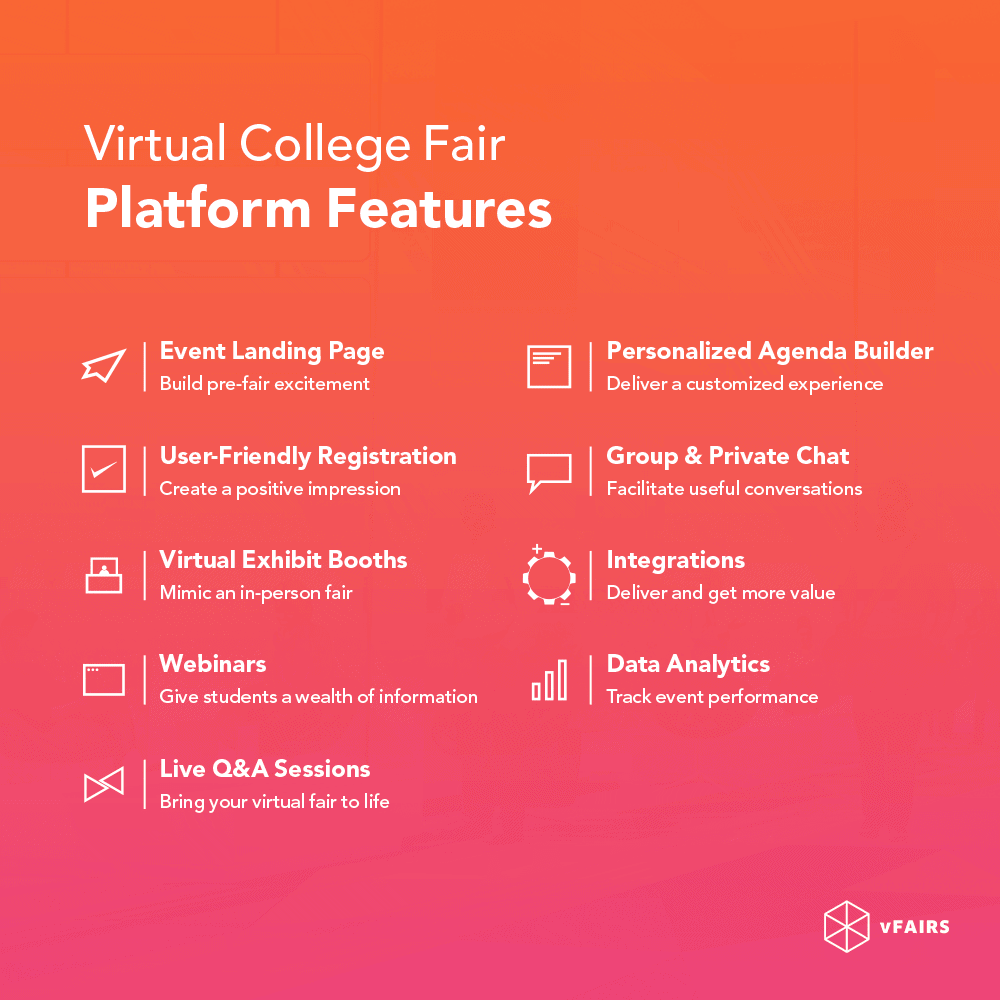
Top 10 Virtual College Fair Platform Features
It’s important to select virtual college fair software features that help you achieve your event goals. The ultimate goal of virtual university fairs is to foster interaction between admissions representatives and students. This means that you need to look at platforms that are purpose-built for interaction.
Each platform has different offerings, but there are some features that can ensure the success of your event. Let’s look at the top 10 features for an online college fair and why each one is important.
1. Event Landing Page
Your event landing page, also known as event website, can help you build pre-fair excitement. Your landing page should be fully branded and include exciting content such as a promotional video, logos of all the colleges participating in the fair, a detailed agenda, speaker bios and an FAQ section. This will help drive student interest up.
2. Registration
You should be able to capture the registration data you need with a custom registration form. The fair registration process should be as efficient and user-friendly as possible. A clear and easy process increases the number of students who complete the registration and creates a positive impression.
3. Exhibitor Booths
Your virtual exhibitor booths should mimic college booths at in-person fairs minus the long queues. College representatives should be able brand their booths to match the institution they are from. They should also be able to upload videos and documents for students to browse and download.
4. Webinars
A very important goal of a college fair is to give students a wealth of college knowledge. So it’s important to create informative webinars for your students and their families. You should be able to choose from live, semi-live and pre-recorded webinar options. This gives your speakers greater flexibility. You should also be able to host concurrent sessions if you have planned a lot of webinars.
5. Live Q&A
Information is important but it won’t help your students if they keep zoning out during your event. You need to make your webinar sessions more interactive by hosting live Q&As. This will help draw in your students and bring your virtual fair to life. Your students will be able to ask questions that will help them understand what the university or college stands for – their student culture, their mission as an institution, how the food is on campus – anything that is important to them.
6. Agenda Builder
Your students should be able to customize their online college fair experience by selecting webinars they are interested in attending. An agenda builder allows your attendees to receive notifications only about agenda items they have chosen. This is especially important if you are hosting numerous and concurrent webinar sessions.
7. Group & Private Chat
The college search process is a human experience that is built on relationships. Your students should be able to interact with college representatives as they would during a physical college fair. Community and 1:1 chat allows your students to have useful conversations with admission representatives.
Look for a platform that offers group chat, audio and video meetings and allows attendees to book appointments.
8. Integrations
Get more value from your virtual fair with integrations. Integrations help you make your event customizable and personalized. You could seamlessly capture registration data with a third-party tool, live stream your webinars to your social media platforms, or make your event memorable with a virtual photo booth. The options should be endless with the right platform provider.
9. Data Analytics
The best part about hosting a virtual event is the amount of data you can gather which can help you accurately track event performance. You should be able to track attendance rates and student activity in real time.
What’s more?
With the right virtual college fair platform, you can tell participating colleges how their booths performed by tracking booth visits, tab clicks, content downloads and chat activity. A comprehensive post-event report is essential if you want to determine ROI and tweak future fairs for success.
10. Document Hosting
It’s not a college fair unless students can gather and take away key information from colleges that they are interested in. College representatives should be able to upload brochures, catalogs, videos and other documents to their booths for students to browse and download.
Pro-tip: You can also create a list of nice-to-have features. This will help you narrow down your solution provider options. Some features that we recommend for this list include gamification, virtual swag bag, attendee match making, and profile search.
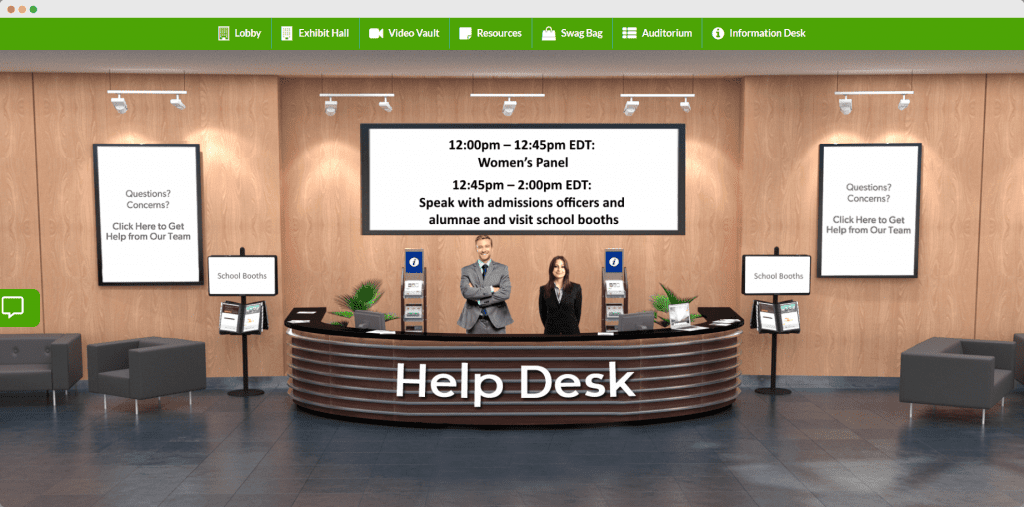
Questions to Ask Your Provider
The right virtual event platform can take your event to the next level. That’s why it’s important to ask the right questions so you can find the best solution for your event.
To help you to discern between platforms, we have prepared a list of questions to have on hand during demo meetings with potential providers.
- What tools will attendees have to network and schedule appointments?
- Do you offer live troubleshooting?
- What analytics does your platform collect?
- How many college fairs have you hosted in the past?
- What engagement features do you provide?
- Have you worked with any schools in our city/country?
- How can you help this fair stand out?
- How long will the event be available on-demand after the live days?
- Do you offer branding opportunities within the platform?
- Is your platform mobile-compatible?
- Can you customize the environment to look like our school?
- Can exhibitors upload videos/panoramic views of their campus?
- Is there an easy way to receive inquiries in real-time within vFairs?
- Is there an attendee limit?
- Do you support immersive 3D environments to make the fair easy to navigate?
Pro-tip: Browse G2 and Capterra reviews for any virtual event platforms that you have shortlisted to easily discern which one can be the best fit for your event.
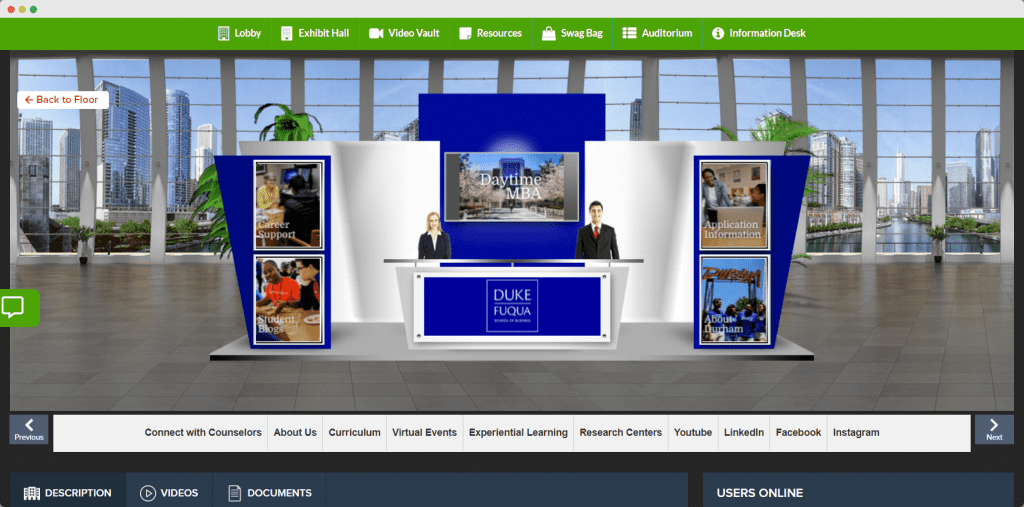
Virtual College Fair Tips for Organizers
Hosting a virtual event can be a daunting task, especially if you haven’t done it before. Here are some tips to help you create a virtual experience for your students that will keep them talking for long after the event ends!
Remember That Content Is King
Prepare powerful keynote presentations and host engaging sessions for your students. You can use a mix of live and pre-recorded content. Focus on the following topics:
- College financing
- Essay writing
- Admissions testing
- College search
- Gap year
- Extracurricular activities
- Campus life
Don’t Open the Fair to All the Students
College fairs are already overwhelming and intimidating for many students. Only high school juniors and seniors in your school are in the right headspace to have meaningful conversations with recruiters. Don’t invite freshmen and sophomores to your virtual college fair.
Make the Most Of the Virtual College Fair Platform
Don’t just pick a platform with basic conferencing features and call it done. Pick a platform that can help maximize targeted, high quality interactions.
Sometimes you have the right platform but you don’t know all of its bells and whistles. Make sure you get plenty of guidance from your virtual event platform provider on how you can make your fair as engaging and interactive as possible.
Help Students Make the Most Of the Event
Your students won’t get much out of the event if they don’t know what to expect. Give your students a list of schools that will be attending the event, a list of questions to help direct pre-fair research and a document that shows them what to expect of the platform on the day of the event. Remember to add plenty of screenshots of the platform to help students easily navigate your online fair.
Pro tip: You can also create a short video for your fair that covers how to use the platform. Add it to your live fair as a pop-up video for attendees.
Host a District-Wide or Regional College Fair
To attract popular colleges to your event join forces with nearby schools to host a larger virtual university fair. When representatives realize that they will be able to reach hundreds or thousands of high school seniors, they won’t want to miss your event.
If you need to know how to plan a virtual college fair, read ‘Creating An Event Plan for Your Virtual Event’.
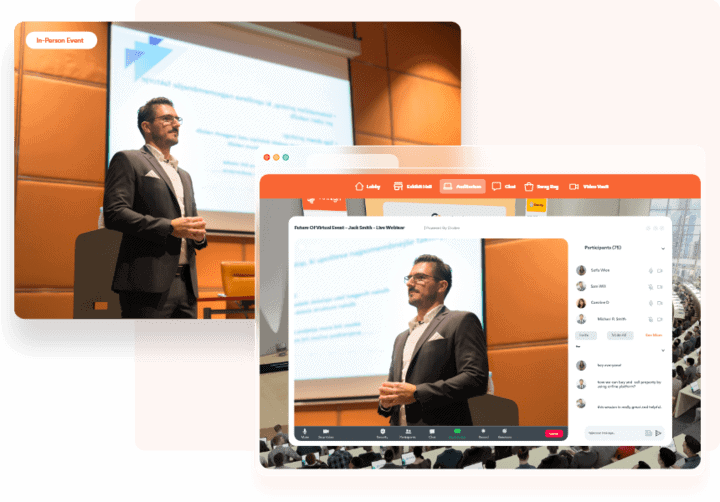
Going Hybrid with Your Virtual College Fair
Hybrid events combine both in-person and virtual experiences. They can be the perfect solution for fair planners that don’t want the limitations of an in-person event, such as: venue capacity, per-person budget constraints, and geographic considerations. For instance, if your education fair has a small budget. You can draw in more attendees virtually without having to get a larger space.
Once you have your virtual event components sorted for your fair, it will be easy to pivot to a hybrid event. The key to going hybrid is to put your student experience first. This means you should keep the branding, message and content consistent. Plan activities that will engage both in-person and virtual attendees.
If you’d like to learn about how to host hybrid college fairs, you can read ‘Hybrid Events: 8 Best Practices’.
In Summary
Virtual college fairs have a lot to offer both event planners and attendees. Now that you know what features to look for in virtual college fair platforms, you will be able to start planning your event. Just remember to ask the providers you shortlisted the right questions and follow our tips to create the best virtual experience for your students and their families.
If you’re looking for more information on the value that vFairs can bring to your virtual fair, check out our Virtual Education Fair.

